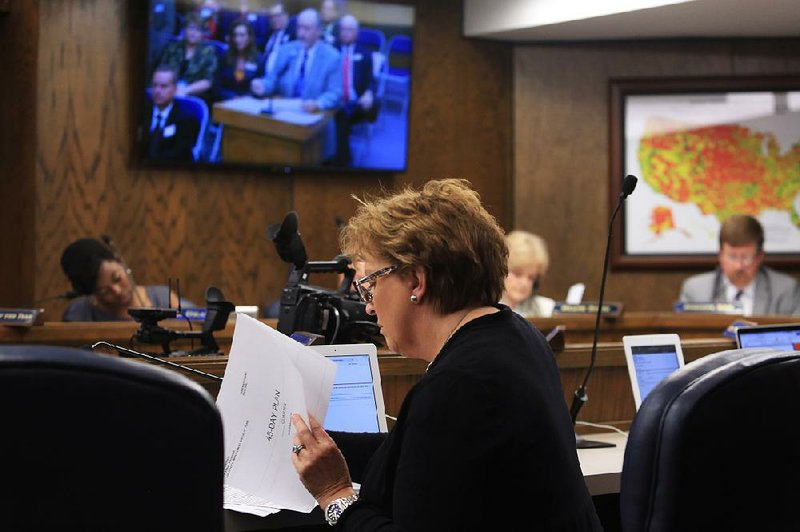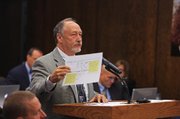The Pine Bluff School District's board, administration and teachers need to work more cohesively to bring three of the district's campuses out of academic distress, members of the Arkansas Board of Education said during a meeting Friday.
Board member Vicki Saviers of Little Rock, who also leads the Education Board's Special Committee on Academic Distress, said there seems to be a "difference of opinion" among school district leaders on how the plan was working so far.
There is a lot going on, Saviers said, but "not in a systemic fashion."
Education Board member Diane Zook of Melbourne said that from the emails she has seen and the conversations she has had with involved parties, there "seems to be a big disconnect."
The state placed three of the southeast Arkansas district's schools -- Pine Bluff High, Jack Robey Junior High and Belair Elementary School -- on academic distress status in 2014 after fewer than half of the students scored at proficient levels on the state math and literacy exams over the past three years.
If no improvement is seen, the individual schools or even the entire Pine Bluff School District is in danger of being taken over by the state. The locally elected School Board could be dissolved, and the superintendent could be removed.
Officials of the district -- which is composed of 86 percent of students below the poverty rate and 97 percent minority students -- are scheduled to appear before the full state board at its November meeting for a comprehensive status report.
"It will be an action agenda item," Zook emphasized.
Pine Bluff district leaders appeared before the full board Friday to report progress made on three recommendations made by the Special Committee at its June 12 meeting. Those objectives included:
• Providing more training for the School Board and district leadership to learn strategies to better support schools in academic distress and to build leadership capacity.
• Working collaboratively with the state's School Improvement Unit, Division of Public School Accountability, to create a strategic, district-wide plan for the 2015-16 school year.
• Monitoring by the district leadership team with support from the state School Improvement Unit of the implementation of the plan and reporting to the state board quarterly.
Zook said she was concerned about the "inordinate amount of money" the district was paying for outside consultants instead of utilizing the state Department of Education's School Improvement Unit.
Superintendent T.C. Wallace told the board in June that he could not be specific about the cost of a contract with From the Heart -- a consulting firm with which Wallace was previously affiliated as a consultant -- because the district may not actually use the maximum number of days capped in the contract that the firm can work with the district.
Saviers said she was concerned that there was an apparent conflict between Wallace and the chief school reform officer, Alesia Smith, in solving the district's issues. Saviers said she was also concerned that the district would be without a superintendent when Wallace's state provisional certificate expires in March 2016. Wallace is a resident of Nashville, Tenn., but he stays in Pine Bluff during the week.
"This seems to be a situation we often see when a school [district] is in academic distress," Saviers said.
There are currently 22 schools in the state classified as academically distressed. They include six Little Rock schools -- Baseline Elementary; Cloverdale and Henderson middle; and J.A. Fair, Hall and McClellan high schools -- and two Pulaski County Special district schools, Jacksonville Middle and Mills University Studies High School.
The list also includes three each in Pine Bluff and Forrest City, and two in Blytheville. The other labeled campuses are in the Dermott, Dollarway, Helena-West Helena, Strong-Huttig and Watson Chapel school districts. Covenant Keepers Charter School in Little Rock is also on the list.
In the Education Board's Special Committee on Academic Distress held after Friday's regular meeting, Blytheville School District Superintendent Richard Atwill told committee members the district as a whole has "embraced" the academically distressed label by aggressively overhauling the whole district, kindergarten through 12th grade.
The Blytheville School District did not contract with an outside consultant for a new plan, but it is utilizing the Department of Education's School Improvement Unit.
The state unit's reflective and introspective questioning "made us truly ask the right questions as to why student achievement is not where it needs to be," Atwill said.
Atwill, as well as Blytheville District Curriculum Coordinator Sally Cooke and Blytheville High School New Tech Director Teryn Spears, spent nearly two hours presenting the board with a status report of systems currently in place.
The main focus, they said, was changing the school's culture to one of candor and cooperation.
The district is working closely with parents, all employees of all levels and inviting the community to join in the fight to save their schools. They have provided computers for all students in third grade through 12th grade, and iPads for kindergarten through second-grade students.
The district has seen a 61 percent decrease in office discipline referrals and a 58 percent reduction in out-of-school suspension rates, Spears said.
Cooke told the board that the district as a whole has "really embedded that report. We've realigned our jobs," adding that the district leadership is physically on site at all the schools, "speaking, hearing and talking to every person in those buildings so we can have a shared message about where we are going to go. No one is off the hook. What is your heart? What is your role? Every single person has to take that ownership."
State Board of Education member Charisse Dean praised the Blytheville district for its great progress and suggested that the district be made a model for other academically distressed schools in the state.
"I hope you're documenting all of this," she said.
Metro on 09/12/2015

